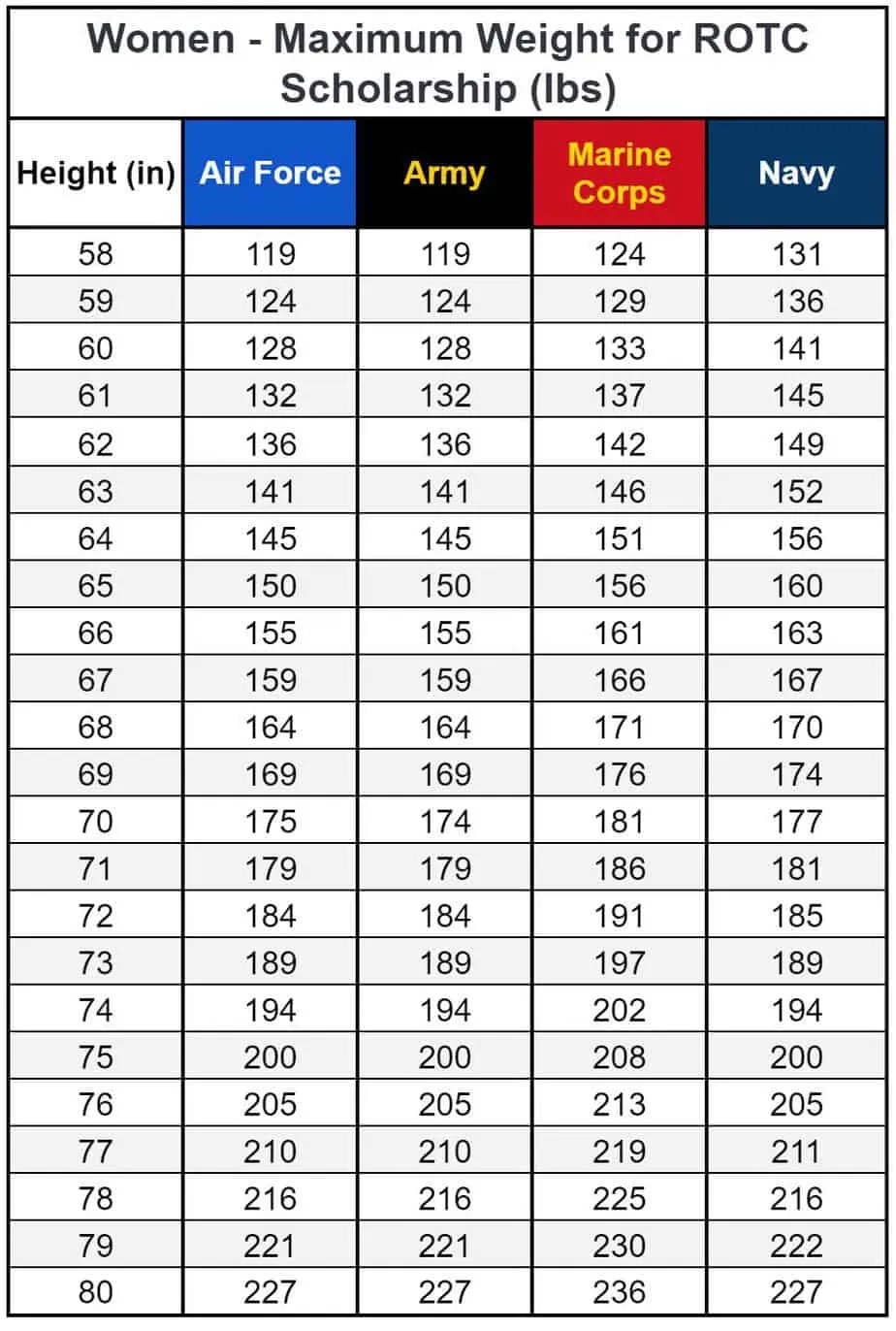
Military weight requirements are an essential aspect of joining and serving in the armed forces. These requirements ensure that all service members meet specific physical standards necessary for optimal performance during training and combat situations. The military's focus on weight is not merely about aesthetics; it is fundamentally linked to the physical demands of military duties, which often require strength, endurance, and agility.
For prospective recruits, understanding the military weight requirements is crucial to ensure eligibility and preparation for service. Each branch of the military, including the Army, Navy, Air Force, and Marines, has its own set of standards, which take into account height, age, and gender. These standards are designed to create a baseline that allows service members to perform at their best in high-stress situations.
Moreover, maintaining appropriate weight is a continuous requirement throughout a military career. Personnel are regularly weighed and assessed to ensure compliance with these standards, as failure to meet them can result in consequences, including additional training or, in serious cases, discharge from service. Understanding these requirements will not only help recruits prepare physically but also mentally for the rigors of military life.
What Are the Specific Military Weight Requirements?
The military weight requirements can vary significantly between different branches. Each branch sets its own height and weight standards, which are based on the Body Mass Index (BMI) and other physical fitness criteria. Here’s a brief overview of the standards for different branches:
- Army: The Army uses a combination of height and weight tables to determine acceptable weight ranges. For example, a soldier who is 68 inches tall should weigh between 140 and 190 pounds.
- Navy: The Navy has specific height and weight requirements, with a similar table system, but it also includes body fat percentage measurements for active-duty personnel.
- Air Force: The Air Force utilizes both weight and body fat percentage as part of its assessment. Their standards are slightly more lenient in terms of weight, but they still emphasize the importance of overall fitness.
- Marine Corps: The Marines have strict weight standards and body composition requirements that all recruits and active members must meet. They focus heavily on physical fitness as a part of their training.
How Are Military Weight Requirements Measured?
Military weight requirements are typically measured using a combination of weight scales and height measurements. In addition to weight, many branches assess body fat percentage to provide a more comprehensive evaluation of a service member's physical condition. This is important as weight alone does not always accurately reflect a person’s fitness level or health.
During the assessment, individuals are weighed in uniform, and their height is recorded. Each branch has specific protocols for measuring body fat, often using calipers or circumference measurements. Recruits and service members must be aware of these measurements and how they affect their overall fitness evaluations.
Why Are Military Weight Requirements Important?
The importance of military weight requirements cannot be overstated. They play a crucial role in ensuring that all service members are physically capable of performing their duties. Some key reasons include:
- Performance: Being within the appropriate weight range helps ensure that service members can perform their tasks effectively, whether in training exercises or combat situations.
- Health and Safety: Maintaining a healthy weight reduces the risk of injury and health complications, which can be detrimental in high-stakes environments.
- Team Dynamics: Physical readiness contributes to the overall effectiveness of military units. When all members meet weight requirements, it fosters a sense of teamwork and accountability.
What Happens If You Don’t Meet Weight Requirements?
Failing to meet military weight requirements can have serious consequences for service members. These may include:
- Extra Training: Individuals may be required to participate in additional physical training programs to help them achieve the necessary standards.
- Performance Evaluation: Consistently failing to meet weight requirements can impact performance evaluations and career advancement opportunities.
- Separation from Service: In extreme cases, service members who do not comply with weight standards may face administrative separation or discharge from the military.
How Can You Prepare to Meet Military Weight Requirements?
Preparing to meet military weight requirements is a proactive process that involves both physical training and nutritional planning. Here are some effective strategies:
- Regular Exercise: Engage in a balanced fitness regimen that includes cardiovascular training, strength training, and flexibility exercises.
- Nutrition: Focus on a diet rich in whole foods, including lean proteins, fruits, vegetables, and whole grains. Avoid excessive processed foods and sugars.
- Monitoring Progress: Regularly track your weight and body measurements to stay accountable and make necessary adjustments to your fitness plan.
Can You Appeal Weight Requirement Decisions?
If you do not meet the military weight requirements, there may be options for appeal or waiver under certain circumstances. Each branch has its own policies regarding appeals, and it typically involves a review process where you can present your case. It is essential to understand the specific guidelines and procedures for your branch if you find yourself in this situation.
Conclusion: The Importance of Understanding Military Weight Requirements
In conclusion, understanding military weight requirements is fundamental for anyone considering a career in the armed forces. These standards are designed to ensure that all service members are physically capable of meeting the demands of military life. By preparing adequately and maintaining a healthy lifestyle, prospective recruits can position themselves for success and fulfillment in their military careers. Whether you are currently serving or seeking to enlist, staying informed about military weight requirements is key to achieving your goals.
ncG1vNJzZmivp6x7o77EnKKepJxjwqx71aKpmqSmnq%2Bmv5ZopKKkmamus8WMsJyin5iperOx0K6gq52dmru1v42hq6ak